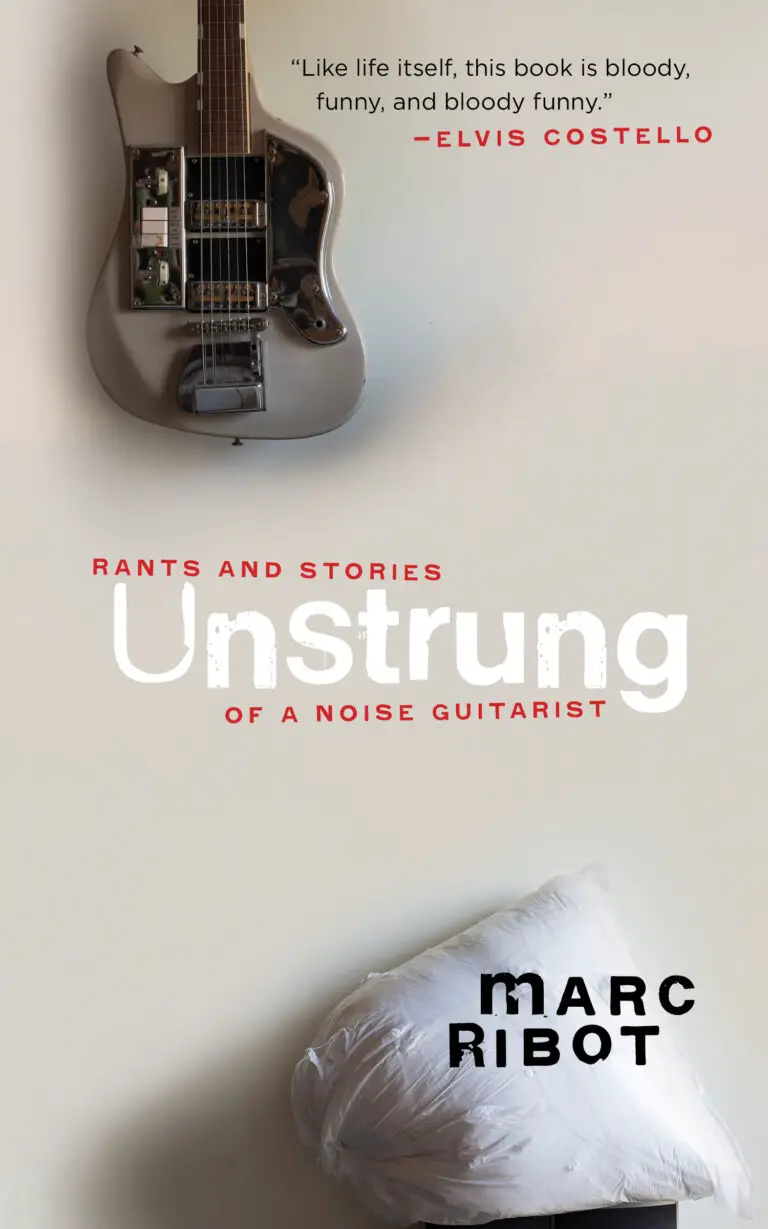Throughout his 40-year career, guitarist Marc Ribot has defied expectations and genre boundaries at every turn. He’s been the go-to guy serving up a singular fusion of rootsy Americana meets outré noise jazz meets Cubano swing with everyone from Tom Waits, Elvis Costello, Robert Plant, Nora Jones and Diana Krall to John Lurie’s Lounge Lizards, the Black Keys and the inexhaustibly productive John Zorn. Now with Unstrung: Rants and Stories of A Noise Guitarist (Akashic Books), Marc Ribot is stepping into the spotlight with his literary debut. And it is one as fresh, fiercely focused, unpredictable and delightfully disorienting as his masterfully knotty guitar work.

First off, this is not a musical memoir per se. It is a collection of darkly funny stories and essays that, in good part, touch upon his thoughts on guitars, amps, touring, composer’s rights and iconic musical partners like punk guitar icon Robert Quine, free jazz legends Derek Bailey and Henry Grimes and producer extraordinaire Hal Willner. But this is a collection that spreads its wings far beyond the world of music. It is a razor-sharp playlist of far-reaching modernist literature, one that puts a Dadaist spin on everything from iPhone failures to treatments for absurdist films that will only ever exist in Ribot’s fevered imagination.
In the first section of the book, “Lies and Distortions,” the guitarist turns his attention to his instrument. “My relation to the guitar is one of struggle,” he writes. “I’m constantly forcing it to be something else: a saxophone, a scream, a car rolling down a hill… I bend them and they bend me.” Marc Ribot also pens a great ode to amps and distortion. In it, he claims his need to play amps at peak volume, to a breaking point that risks both his hearing and livelihood, provides to a guitarist “what makeup is to a drag queen.” His love of distortion is also compared to the appeal of “vocal chords eroded by whiskey and screaming” and “the junked-out weakness of certain horn players” like Dexter Gordon or Lester Young. Ribot also pens a moving tribute to his first teacher, the renowned classical guitar master from Haiti, Frantz Casseus. Ribot’s distinct style may have been informed by his early lessons and lifelong friendship with this man, who like Bela Bartok, merged the folk of his native land with European classical tradition. Ribot’s fierce defense of creators’ rights is illustrated in his discussions of Casseus’ hand-to-mouth existence, due to being cheated out of his composer royalties for decades until the literal last months of his life. He also passionately tackles this issue in “The Attack on Artist’s Rights…and Me,” a much socially-shared 2014 essay first published in Talkhouse Magazine.
Some of my favorite pieces in the book are Ribot’s generally observational ones. In “Animal Sounds,” his astute ears dissect a rooster scream, which is not a single scream at all, but a mindlessly repetitive three-part pattern, a sonic cage which is the “opposite of being free as a bird” to the author. He also shares how a poetry exercise in 2nd grade taught him a lesson about both unconscious plagiarism and life losses. There are also flights of fancy about a rocket scientist who dies because he can’t seem to learn how to tie his shoelaces properly and a boy, named Woody, who tries homespun horticulture to graft himself to a tree. There’s also a story where Botox leads to murder. This is all because a husband can’t detect the increasingly aggravated expressions on his wife’s newly treated and immobile face. Like his ofttimes sensibly brief guitar solos, a good deal of the stories here are rendered in a single page or two. They have a darkly humorous, almost haiku style slapstick that brings to mind the work of the great Italo Calvino in works like Italian Folktales and Marcovaldo.

The fantasies continue in the third section entitled “Film (Mis)Treatments.” In one, a past-its-prime avant-garde band on tour is not concerned with their performances, only where they are going to eat in each city. When the tour is cancelled after a single disastrous performance, their manager wants to pull the travel and hotel accommodations. So, the band kills him… and continues to eat its way across the Europe! In “The Club Date Musician (Or Saturday Night Nausea),” he lays out the agonizing travails of the wedding band industry, for both the players and the people who hire them. He also observes how all society band leaders seems to take new names that are two first names, and waspy ones at that, like the fictional Nathaniel (Nat) Alexander in his story.
There are also shades of what I assume is Ribot’s personal life outside music, and as a longtime New Yorker, in this brief but enjoyable book. In one story, we learn how a 10-year rent battle with his landlord in the Lower East Side unexpectedly ends in his favor, earning him $170,000 from an escrow account and a move to leafy Cobble Hill, Brooklyn. In “Kaddish for Joan,” we see how the slightly older artist cousin he so admired in his teens succumbs to pressures from her Jewish family – giving up art, the hippie life and going slowly mad in suburbia. A story that especially touched me was “Today I Did Something Remarkable.” In this, Ribot stroll down memory lane and comes to the realization he is entering a new stage of life, as he slowly takes apart the Ikea loft bed his now-adult daughter used throughout her youth.
For some musicians, talent is not limited to the world of sound and lyric. Joni Mitchell, Tony Bennett, Bob Dylan and David Bowie are among the many musos who are pretty good painters. Rob Zombie, George Harrison and David Bryne are among those who have produced or directed acclaimed films. With Unstrung, Ribot is joining this boundary crossing crew, with a collection of diverse, wonderful stories that sing even when they are not about music.
Check out Marc Ribot, as sideman and sideman, on this playlist.


Comments are closed.